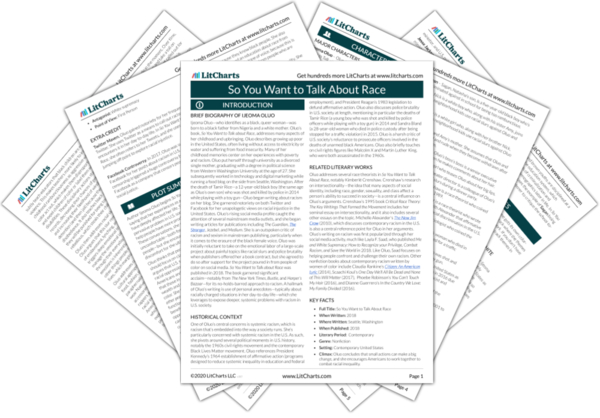Racism, Privilege, and White Supremacy
In So You Want to Talk about Race, author Ijeoma Oluo argues that white supremacy is deeply entrenched in American culture. Oluo sees the United States as systematically centered on privileging the needs of white people at the cost of people of color. She finds this agenda so pervasive that it shapes every aspect of U.S. society, including education, law enforcement, politics, and the media. She argues that individual racists are the product of…
read analysis of Racism, Privilege, and White SupremacyConfronting Racial Pain
Ijeoma Oluo’s So You Want to Talk about Race is a moving account of the deep emotional burden of racism in the United States. Oluo shows how racist encounters trigger feelings of hurt, shame, and anger in people of color, which compound old wounds that never have a chance to heal. She thinks that insensitivity to racial pain is one of the biggest reasons why conversations about racism go wrong or end in disaster…
read analysis of Confronting Racial PainIntersectionality, Oppression, and Social Justice
In So You Want to Talk about Race, author Ijeoma Oluo argues that people are oppressed for many reasons in the United States beyond race, including gender, sexual orientation, class, ability, physical appearance, and more. These aspects of a person’s identity and socioeconomic status intersect and create different challenges for different people. Oluo warns against assuming that all marginalized people face the same general experience of oppression. For instance, a straight black man, a…
read analysis of Intersectionality, Oppression, and Social Justice
Cultural Appropriation
In So You Want to Talk about Race, Ijeoma Oluo looks at how borrowing, or appropriating, from other cultures can be a form of oppression. While many people think of the U.S. as a “melting pot” of cultures that all influence one another, Oluo argues U.S. society is set up to privilege white culture. This means that when white people borrow the trappings of marginalized culture (like their music, hairstyles, or food), their…
read analysis of Cultural Appropriation






